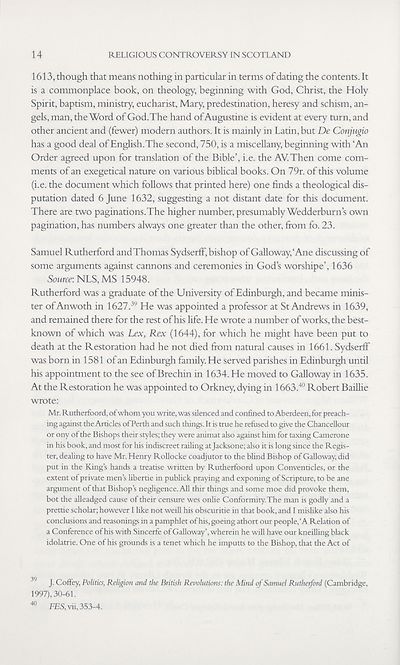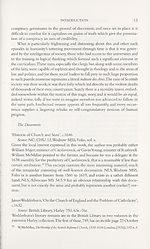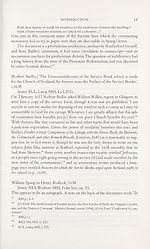Series 5 > Religious Controversy in Scotland 1625-1639
(29) Page 14
Download files
Complete book:
Individual page:
Thumbnail gallery: Grid view | List view

14
RELIGIOUS CONTROVERSY IN SCOTLAND
1613, though that means nothing in particular in terms of dating the contents. It
is a commonplace book, on theology, beginning with God, Christ, the Holy
Spirit, baptism, ministry, eucharist, Mary, predestination, heresy and schism, an¬
gels, man, the Word of God. The hand of Augustine is evident at every turn, and
other ancient and (fewer) modern authors. It is mainly in Latin, but De Conjugio
has a good deal of Enghsh.The second, 750, is a miscellany, beginning with ‘An
Order agreed upon for translation of the Bible’, i.e. the AV.Then come com¬
ments of an exegetical nature on various biblical books. On 79r. of this volume
(i.e. the document which follows that printed here) one finds a theological dis¬
putation dated 6 June 1632, suggesting a not distant date for this document.
There are two paginations.The higher number, presumably Wedderburn’s own
pagination, has numbers always one greater than the other, from fo. 23.
Samuel Rutherford and Thomas Sydserff, bishop of Galloway,‘Ane discussing of
some arguments against cannons and ceremonies in God’s worshipe’, 1636
Source: NLS, MS 15948.
Rutherford was a graduate of the University of Edinburgh, and became minis¬
ter ofAnwoth in 1627.39 He was appointed a professor at St Andrews in 1639,
and remained there for the rest of his life. He wrote a number of works, the best-
known of which was Lex, Rex (1644), for which he might have been put to
death at the Restoration had he not died from natural causes in 1661. Sydserff
was born in 1581 of an Edinburgh family. He served parishes in Edinburgh until
his appointment to the see of Brechin in 1634. He moved to Galloway in 1635.
At the Restoration he was appointed to Orkney, dying in 1663.40 Robert Baillie
wrote:
Mr. Rutherfbord, of whom you write, was silenced and confined to Aberdeen, for preach¬
ing against the Articles of Perth and such things. It is true he refused to give the Chancellour
or ony of the Bishops their styles; they were animat also against him for taxing Camerone
in his book, and most for his indiscreet railing at Jacksone; also it is long since the Regis¬
ter, dealing to have Mr. Henry Rollocke coadjutor to the blind Bishop of Galloway, did
put in the King’s hands a treatise written by Rutherfoord upon Conventicles, or the
extent of private men’s libertie in publick praying and exponing of Scripture, to be ane
argument of that Bishop’s neghgence. All thir things and some moe did provoke them,
bot the alleadged cause of their censure wes onlie Conformity. The man is godly and a
prettie scholar; however I like not weill his obscuritie in that book, and I mislike also his
conclusions and reasonings in a pamphlet of his, goeing athort our people,’A Relation of
a Conference of his with Sincerfe of Galloway’, wherein he will have our kneilhng black
idolatrie. One of his grounds is a tenet which he imputts to the Bishop, that the Act of
39 J. Coffey, Politics, Religion and the British Revolutions: the Mind of Samuel Rutherford (Cambridge,
1997), 30-61.
40 FES, vii, 353-4.
RELIGIOUS CONTROVERSY IN SCOTLAND
1613, though that means nothing in particular in terms of dating the contents. It
is a commonplace book, on theology, beginning with God, Christ, the Holy
Spirit, baptism, ministry, eucharist, Mary, predestination, heresy and schism, an¬
gels, man, the Word of God. The hand of Augustine is evident at every turn, and
other ancient and (fewer) modern authors. It is mainly in Latin, but De Conjugio
has a good deal of Enghsh.The second, 750, is a miscellany, beginning with ‘An
Order agreed upon for translation of the Bible’, i.e. the AV.Then come com¬
ments of an exegetical nature on various biblical books. On 79r. of this volume
(i.e. the document which follows that printed here) one finds a theological dis¬
putation dated 6 June 1632, suggesting a not distant date for this document.
There are two paginations.The higher number, presumably Wedderburn’s own
pagination, has numbers always one greater than the other, from fo. 23.
Samuel Rutherford and Thomas Sydserff, bishop of Galloway,‘Ane discussing of
some arguments against cannons and ceremonies in God’s worshipe’, 1636
Source: NLS, MS 15948.
Rutherford was a graduate of the University of Edinburgh, and became minis¬
ter ofAnwoth in 1627.39 He was appointed a professor at St Andrews in 1639,
and remained there for the rest of his life. He wrote a number of works, the best-
known of which was Lex, Rex (1644), for which he might have been put to
death at the Restoration had he not died from natural causes in 1661. Sydserff
was born in 1581 of an Edinburgh family. He served parishes in Edinburgh until
his appointment to the see of Brechin in 1634. He moved to Galloway in 1635.
At the Restoration he was appointed to Orkney, dying in 1663.40 Robert Baillie
wrote:
Mr. Rutherfbord, of whom you write, was silenced and confined to Aberdeen, for preach¬
ing against the Articles of Perth and such things. It is true he refused to give the Chancellour
or ony of the Bishops their styles; they were animat also against him for taxing Camerone
in his book, and most for his indiscreet railing at Jacksone; also it is long since the Regis¬
ter, dealing to have Mr. Henry Rollocke coadjutor to the blind Bishop of Galloway, did
put in the King’s hands a treatise written by Rutherfoord upon Conventicles, or the
extent of private men’s libertie in publick praying and exponing of Scripture, to be ane
argument of that Bishop’s neghgence. All thir things and some moe did provoke them,
bot the alleadged cause of their censure wes onlie Conformity. The man is godly and a
prettie scholar; however I like not weill his obscuritie in that book, and I mislike also his
conclusions and reasonings in a pamphlet of his, goeing athort our people,’A Relation of
a Conference of his with Sincerfe of Galloway’, wherein he will have our kneilhng black
idolatrie. One of his grounds is a tenet which he imputts to the Bishop, that the Act of
39 J. Coffey, Politics, Religion and the British Revolutions: the Mind of Samuel Rutherford (Cambridge,
1997), 30-61.
40 FES, vii, 353-4.
Set display mode to:
![]() Universal Viewer |
Universal Viewer | ![]() Mirador |
Large image | Transcription
Mirador |
Large image | Transcription
Images and transcriptions on this page, including medium image downloads, may be used under the Creative Commons Attribution 4.0 International Licence unless otherwise stated. ![]()
| Scottish History Society volumes > Series 5 > Religious Controversy in Scotland 1625-1639 > (29) Page 14 |
|---|
| Permanent URL | https://digital.nls.uk/127328313 |
|---|
| Description | Over 180 volumes, published by the Scottish History Society, containing original sources on Scotland's history and people. With a wide range of subjects, the books collectively cover all periods from the 12th to 20th centuries, and reflect changing trends in Scottish history. Sources are accompanied by scholarly interpretation, references and bibliographies. Volumes are usually published annually, and more digitised volumes will be added as they become available. |
|---|


